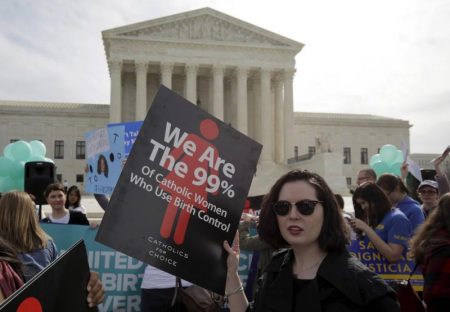WASHINGTON/NEW YORK, (Reuters) – President Donald Trump’s administration yesterday undermined requirements under the Obamacare law that employers provide insurance to cover women’s birth control, keeping a campaign pledge that pleased his conservative Christian supporters.
New rules from the Department of Health and Human Services will let businesses or non-profit organizations lodge religious or moral objections to obtain an exemption from the law’s mandate that employers provide contraceptives coverage in health insurance with no co-payment.

Conservative Christian activists and congressional Republicans praised the move, while reproductive rights advocates and Democrats criticized it. It was unclear how many employers would actually drop birth control coverage on religious grounds, and there were significant doubts that many big ones would.
Within hours, the American Civil Liberties Union sued the administration in federal court in San Francisco to try to halt the rule, claiming among other things that it violated the U.S. Constitution’s requirement for separation of church and state.
The states of Massachusetts and California also sued, and Democratic state attorneys general in another 16 states threatened legal action.
“This is a landmark day for religious liberty. Under the Obama administration, this constitutional right was seriously eroded,” Republican House of Representatives Speaker Paul Ryan said.
“The Trump administration just took direct aim at birth control coverage for 62 million women,” Planned Parenthood Federation of America President Cecile Richards said.
“With this rule in place, any employer could decide that their employees no longer have health insurance coverage for birth control,” Richards added.
Trump, who criticized the birth control mandate in last year’s election campaign, won strong support from conservative Christian voters. The Republican president signed an executive order in May asking for rules that would allow faith-based groups to deny insurance coverage for services they oppose on religious grounds.
The contraception mandate was implemented as part of the 2010 Affordable Care Act, Democratic former President Barack Obama’s signature legislative achievement. Trump and Republicans in Congress campaigned against Obamacare, as the law is known, but could not get enough votes to repeal it as they had promised.
In its reasoning for the move, the administration said among other things that mandating birth control coverage could foster “risky sexual behavior” among teens and young adults. It overturned the Obama administration’s view that the birth control requirement was necessary to meet the government’s “compelling interest” to protect women’s health.
“This administration’s contempt for women reaches a new low with this appalling decision,” top House Democrat Nancy Pelosi said.
The administration broadened narrow existing religious exemptions to include an exception “on the basis of moral conviction” for non-profit and for-profit companies.
Federal rules implemented under Obamacare required employers to provide health insurance that covers birth control, but religious houses of worship were exempted. Some private businesses sued regarding their rights to circumvent such coverage, and the Supreme Court ruled in 2014 that they could object on religious grounds.
Case Western Reserve University School of Law professor Jonathan Adler said it was unlikely publicly traded companies would seek exemptions. “Why would a publicly traded company risk alienating potential shareholders by taking such a step?” Adler said.
Ellen Kelsay, chief strategy officer at the National Business Group on Health, a lobbying group for large companies, said, “Most large employers have provided coverage for birth control prior to any mandates and we expect most will continue to do so irrespective of any exemptions that may become available.”
According to one estimate, only 3 percent of nonprofit groups offering health benefits have objected to contraceptives coverage.
“HHS has issued a balanced rule that respects all sides – it keeps the contraceptive mandate in place for most employers and now provides a religious exemption,” said Mark Rienzi, one of the lawyers for the Little Sisters of the Poor. The order of Roman Catholic nuns, which runs care homes for the elderly, had challenged the mandate in court.
The Little Sisters and other Christian nonprofit employers objected to a 2013 compromise offered by the Obama administration that allowed entities opposed to providing contraception insurance coverage to comply with the law without actually paying for the required coverage.
The Justice Department released two memos that will serve as the government’s legal basis for justifying the rule and laying out a framework for how apply religious liberty issues in legal opinions, federal rules and grant making.
In another decision popular with Trump’s evangelical supporters, the Justice Department on Wednesday reversed federal policy and declared that federal law banning sex discrimination in the workplace does not protect transgender employees. Trump also has removed protections for transgender students and moved to ban transgender people from the military.





